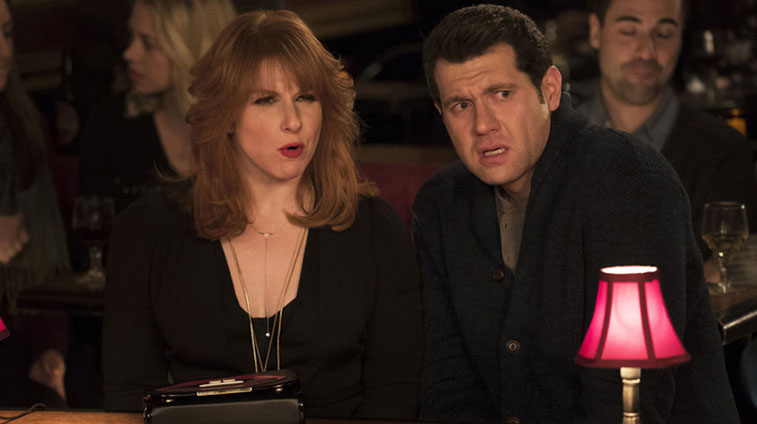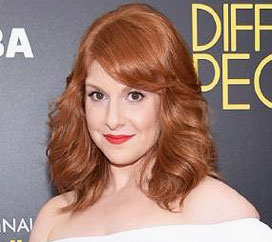
Good Company
What makes characters likeable? Julie Klausner, star and creator of Hulu’s Difficult People, explains why, when it comes to watchability, it’s more important for them to be funny than moral.
 Getty Images
Julie Klausner
Getty Images
Julie Klausner
What's worse in a character, immorality or bad company? The truth is people want to keep the company of characters that are fun to watch...Anyone who's funny is likeable, truly.
As it turns out, landing your own sitcom isn’t as easy as it looks. For Julie Klausner, her single-camera, Amy Poehler-produced comedy Difficult People, now streaming on Hulu, is the culmination of 15 years hard labor.
“I've been pounding the pavement since 2000,” she explains. “I tried a lot of different things in comedy, I've worked for a lot of productions in non-creative capacities, I've been working towards this for a long time.”
But what set her apart from the rest? Some might postulate that all the pavement pounding, along with her work as a writer-performer with the Upright Citizens Brigade, her successful memoir I Don’t Care About Your Band, and her popular podcast “How Was Your Week?” might have something to do with her success. She, however, has another theory.
“Mostly I had sex with the right people,” claims Klausner. “And a bunch of the wrong ones.”
How do you make unlikable people likable?
You make them funny. What's worse in a character, immorality or bad company? The truth is people want to keep the company of characters that are fun to watch and if a character is cranky and feels comfortable with themselves, those are things that can be very cathartic, those are things that can be very entertaining. Anyone who's funny is likeable, truly.
So it's like that friend you have who is really kind of an a-hole but he's funny so that’s okay?
I personally have done a pretty good job at this point getting rid of friends in my life that are assholes. I much prefer to spend time with funny assholes in the form of watching television and movies.
So it's like a safe way of doing that without actually having to deal with them and loan them money.
Exactly, exactly.
Then the show is like therapy, in a way.
Every show is like therapy and company. Billy and I are very passionate about pop culture and part of that comes from the fact that both of us grew up not really having the best possible relationship to our peers – and I'm speaking for myself here, I don't want to put words in Billy's mouth. Something I've found with people that share my experience is that when you don't feel popular or you don't quite know how to talk to people your own age about normal stuff, you tend to get very involved in something that makes you feel like you're different or better, or at least occupied, and for me that was watching a lot of TV and a lot of movies. And that's something that a lot of people can relate to, especially people that are passionate about television and theater.
So you're saying you're a geek basically.
Yes, I'm saying that movies and TV are a substitute for friends.
I'm right there with you.
A great substitute for friends. No downside.
Are you familiar with the Pet the Dog rule of screenwriting, that when you have a character who's kind of despicable, if you have them do this nice little thing like pet a dog, people will forgive them for their bad habits? I don't see you agreeing with that too much. Thoughts?
It's important for me to show on Difficult People that Billy and Julie are very loyal to each other. If this is a show about friendship, I feel strongly that we shouldn't watch the characters fight, that we shouldn't have stories where the two of them are in a conflict that possibly suggests that their friendship isn't the most important thing to both of them. That buys us a lot of bad behavior, because everybody wants that kind of friendship. And that loyalty is a very important value.
So they have to be funny but also that loyalty adds to the sympathy from the viewers.
I think so. I mean I definitely don't have as strong of a bond on my show to my boyfriend as I do to Billy and TV shows about friendships tend to resonate as realer sometimes because the language of friendships is possibly easier to approximate than the language of love, romantic love. Or maybe that's just me not having an easy time talking to men on dates. I don't know.
How much of you is Julie Kessler?
Enough to situate my point of view so it's easy to write for her but the truth of the matter is that Julie Kessler is way less self-aware than I am and probably in that regard a lot dumber. She doesn't understand why people would ever be mad at her when she does things that are shitty, she doesn't take responsibility for her actions, she has no idea the kind of bridges she burns by acting tempestuously, and she also gets to say things that I wish I had been fast enough or brave enough to have said on the spot when they happened, but I have the privilege of being able to write later.
In interviews, Larry David is only a marginally nicer version of that guy you see in Curb Your Enthusiasm, and I think people expect that. As more people see your show, do you think people on the streets are going to mistake you for Julie Kessler?
I long for the day in which my behavior will only exceed the expectations of people that haven't yet met me. That sounds amazing. I was listening to an interview with Larry David recently where he said because of Curb Your Enthusiasm he's able to act more rudely, and it's okay because people expect it from him. He's able to leave dinner parties before dessert, and no one like gives him any shit because that's what they expect. That's the best possible scenario, that people are whatever the opposite of disappointed is whenever they see what you're really like.
The whole idea of how your stage persona and the real you intersect, is that something you put much thought into?
I do. The version of myself that is the lead character in my memoir is very different than the version of myself who speaks into a microphone for her podcast; it's a very different version of the person who is in the writing room and figures out where the stories in Difficult People are going to go. They vary on levels of vulnerability, self-awareness, whether or not it's more important to be considered smart, funny or honest. But the thing that they all have in common is they all desperately, desperately need to be loved by everybody – which is surprising.
To be able to examine yourself from all those different angles and write about must be incredibly therapeutic.
Absolutely. I have the best job in the world, I'm so lucky it's just amazing. It's therapeutic, and it's fun to rewrite the way things actually happened so that you can say what you wanted to say in the moment or act like an idiot. A lot of this show, for me, was just a chance to give myself presents, in a way, like when you buy something for yourself and then you open it six months later or you find a $20 bill in your pocket from an old coat. That's really how I feel when I get to act out the dialogue I've written for myself.
In the episodes where there are multiple storylines going on and then they all converge and everything works like a poem, how do you do that? How do you write that poem?
First of all I appreciate you comparing it to a poem, I've never had anything written be compared to a poem – maybe a dirty limerick here and there but…
It's hard and it's fun and every time it happens it's always a surprise. Whenever you're able to make something creatively that you like it's a miracle, even if you do it over and over again and you have the wherewithal to know that this has happened historically. The answer is it varies. When I sat down to write the pilot, I just figured that out in advance how stories that I had told on my podcast might interconnect.
On the show I'm lucky to have my showrunner, Scott King. The two of us sit in a room and we talk and talk and talk and until we have these extremely detailed outlines, and then I go off and write the first draft, and he gives me notes, and we rewrite as needed. But lately what we've been doing is talking through each story beat by beat and then knowing in the background what else could be happening, we try to look for connectivity, but in no way is that a recipe or a spell for something magical because it just always happens as it happens. Creativity is chaos; to apply mathematical order onto it is usually folly. I understand the notion of imposing discipline on it and you can certainly make yourself show up every day – but whenever that stuff happens it's very exciting.
If it became mathematical to you would you say that's probably the time when it's time to wrap up the series?
I don't even know if it would get to that point because I don't have a mathematical brain, I don't really think about things structurally or pattern-wise. I know that there are people who do, and I really like working with people who do because they bring that quality into the room, but when I'm out of ideas or I'm sick of thinking and writing about myself –which hasn't happened yet, for some reason – then I don't know what I'll do. Maybe I'll move to Vermont and open a bakery and start breeding dogs, but I doubt that's going to happen. I may as well just kill myself, no offense to people who live in Vermont, and I do love dogs and baked goods, but…
They don't mix.
Yeah, they don't mix. I just don't know how I'd ever maintain sanity if I didn't write about myself, a lot – or talk about myself.
Do you think Julie Kessler and Billy Epstein would ever make good movie characters and how so?
They would make great movie characters, and if the future producer of the Difficult People movie is reading this, they would clearly be so compelling that it would make you tons and tons of money.
